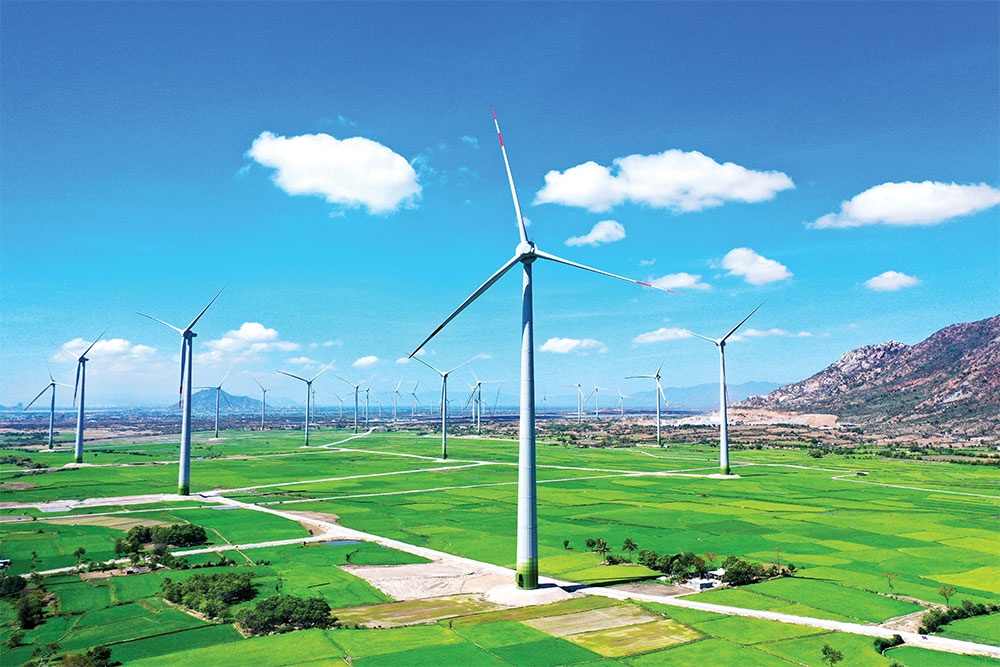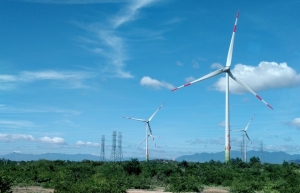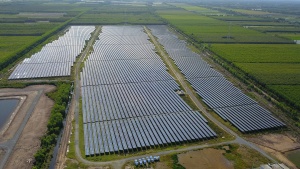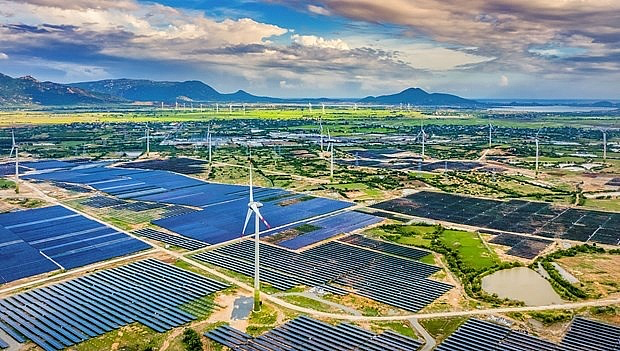Distinct renewable energy law may be required tonic
The government has requested that the Ministry of Industry and Trade (MoIT) study the feasibility of a new law regarding renewable energy, according to an announcement from the Government Office at the start of April.
 |
| A group of energy projects in Vietnam are simply waiting for approval to become officially operational, photo Le Toan |
The Government Office issued the notice regarding the conclusion of Deputy Prime Minister Tran Hong Ha’s March 15 meeting on legislation related to renewable energy (RE). According to the document, DPM Ha requested that the MoIT “expeditiously examine and finish the dossier of applications for the creation of a law on renewable energy” and “comprehensively study global experience” in order to review the draft direct power purchase agreement pilot mechanism to be implemented in Vietnam.
Vietnam has been struggling to introduce a new overarching energy plan for this decade. In a document sent to the prime minister in March, the Binh Thuan Wind and Solar Energy Association and 36 related investors stated they face the risk of financial failure because 34 projects (28 wind projects and 6 solar schemes) have completed construction and testing but are still waiting for electricity grid approval.
Solar power plants have been waiting approximately 27 months for a new mechanism, while wind power plants have been waiting approximately 17 months.
Since 2021, government agencies, specialised research units, and consultants have proposed numerous transitional energy solutions. Analysts estimate that unrecognised commercial operation dates and grid-connected wind farms could produce about 10 billion kWh annually to meet the demand. The current situation, therefore, is resulting in substantial waste and harm to investors and the Vietnamese economy.
According to Circular No.15/2022/TT-BCT issued by the MoIT in October 2022, the production of electricity price brackets for RE is on an upward trend. It stipulates approaches and regulations for construction and it establishes power generation price brackets for terrestrial solar plants, floating solar plants, and inland and offshore wind power plants. However, the price ranges do not generate agreement between Electricity of Vietnam (EVN), clients, investors, or vendors.
According to the Binh Thuan Wind and Solar Energy Association, investors are still waiting for the government to direct the MoIT to modify the new power pricing mechanism for transitional projects to reflect the current situation. “Due to legal flaws as well as a lack of financial efficacy for investors, current policies cause investors to feel uneasy and anxious,” said association chairman Bui Van Thinh.
Existing laws are insufficient
Nguyen Van Vy, vice president of the Vietnam Energy Association, stated that the absence of a distinct law on RE in Vietnam affects and restricts the lure of capital for the growth of this energy source. Regulations on promoting and backing the development of RE are dispersed throughout numerous other legal documents, promulgated and overseen by numerous ministries and industries.
“The achievements and progress of the current legal system are insufficient for Vietnam’s power industry to remedy its low development circumstance, requiring the further making of policies and amending some laws to conform to reality; drawing in funding for development towards guaranteeing energy security and developing RE,” Vy said.
The National Assembly has issued numerous legal documents, such as the Law on Electricity in 2004, the Law on Atomic Energy in 2008, the Law on Economical and Efficient Use of Energy in 2010, and the Law on Petroleum last year. But Vy believes that RE requires a separate set of regulations.
“Vietnam must focus on three main aspects to lay the groundwork for the energy transition by 2050: energy efficiency, RE development, and electrification,” he said. “Increasing energy self-sufficiency by maximising the use of domestically produced RE will improve energy supply and demand autonomy and contribute to stable supply.”
Currently, the non-state economic sector’s interest in investing in the development of the energy industry is still limited, Vy remarked. Therefore, in order to institutionalise and create a legal corridor to attract resources for RE development, the Vietnamese government must investigate and devise a new law on RE.
Concurrently, reviewing and adjusting the RE Development Strategy, promulgating energy development plans under the Law on Planning 2018, and amending and supplementing a number of existing legal documents will help foster the development of energy enterprises, he added.
Selective consumption
Associate Professor Dr. Bui Xuan Thong of the Institute of Oceanography and Environment at the Vietnam Union of Science and Technology Associations remarked that between 2016 and 2020, Vietnam made a significant advancement in RE development. Now, slowly resolving concerns about the future orientation of the energy industry and the lack of indication of the pricing mechanism are currently the greatest obstacles to the development of RE.
“The legality of the energy industry as a whole and of each energy segment is still restricted, inconsistent, and uncoordinated internationally. Investment plans on state management of energy resources are absent and uneven; technological and scientific investments in the industry innovate slowly; and the energy planning strategy has not yet been released,” Thong said.
As a result of the global energy crisis of 2022 markets such as Thailand, Taiwan, and Germany have modified their policies and laws regarding RE development in order to adapt to the fluctuating market conditions.
Taiwan’s experience demonstrates that a distinct Law on Renewable Energy necessitates government support for the development of RE. In 2017, Taiwan passed a law mandating the use of RE sources to generate 20 per cent of the nation’s electricity by 2025 and to eliminate all greenhouse gas emissions by 2050.
Taiwan’s development of clean energy has progressed through a number of phases, focusing on research and development and establishing a comprehensive RE chain. The Taiwanese government annually provides funding and subsidies for a variety of system models.
Dr. Pham Canh Huy of the School of Economics and Management at Hanoi University of Science and Technology recommended that Vietnam adopt specific objectives and stable, long-term policies to attract investments for RE development initiatives.
“An auction mechanism for the purchasing price of RE is one of the most important policies for maintaining the expansion of the RE market because it is not only transparent but also creates a basis for the market’s sustainable development,” Huy said.
In Vietnam, the cost of solar and wind power is individually negotiated for each project. This results in challenges with balancing the burden in each region; while EVN cannot decide on the electricity price, discussing a single electricity price with each investor is extremely complex due to the large number of difficult points to clarify. The management agency will lose its drive, and it will be challenging to identify the source of power entering the burden, Huy explained.
“Vietnam should adopt an auction system, as this is the only method to address the country’s current inadequacies as well as its future course of action,” he said. “The MoIT must first issue a decree governing and regulating proposal documents. Since 2019, multiple variants of the renewable electricity auction have been constructed in Vietnam, but there is currently no legal justification for electricity auctions.”
The incentive system for RE development must be “flexibly designed” so that it can be altered according to the specific form of the project and the scale of the projects, according to Huy.
He also proposed “close and comprehensive collaboration in the process of formulating policies and regulations on RE development”; concurrently, the enactment of strategies and legislation on RE development for corporations in the energy industry should be made concrete as soon as possible.
| The MoIT estimates that RE’s electricity output has reached 130 billion kWh at the end of December 2022, accounting for almost 48 per cent of Vietnam’s total electricity generation output. This includes 35 per cent hydroelectricity and 13 per cent wind, solar, and biomass energy. The ministry also estimates that the proportion of RE generation in the power generation structure of Vietnam’s power system has increased from 27 per cent in 2010 to more than 48 per cent in 2022, with a particularly large contribution from wind and solar power in the 2019-2022 period. The proportion of RE sources has considerably increased since the September 2022 report, according to the draft Power Development Plan VIII submitted in October 2022. The proportion of RE sources (excluding hydroelectricity) has increased from 24.3 per cent to 25.7 per cent to 27.3 per cent in 2030, and will continue to rise to 59 per cent in 2050. Between 2030 and 2050, the use of solar energy will skyrocket. Therefore, the capacity of concentrated solar power and wind power will be 8,736MW and 28,480MW, respectively, in 2030 and 136,323MW and 153,550MW, respectively, in 2050. |
 | SK E&S sets solid footprint in renewable energy SK E&S, South Korea's largest private renewable energy operator, signed an agreement to buy a 99.99 per cent stake in New Renewable Energy JSC No.1, which is a subsidiary of Gia Lai Power Electricity JSC to set a foot in the renewable energy sector in Vietnam. |
 | BCG Energy, Hanwha Energy agree new bond payment deadline Vietnam's BCG Energy and its Singaporean partner Hanwha Energy have concluded a new timeline for the former to pay the latter part of an overdue bond. |
 | EVN must settle transitional renewable energy power tariffs before March 31: MoIT The Ministry of Industry and Trade (MoIT) has mandated that Electricity of Vietnam (EVN) and investors in wind and solar power reach an agreement on energy rates by March 31. |
What the stars mean:
★ Poor ★ ★ Promising ★★★ Good ★★★★ Very good ★★★★★ Exceptional
Related Contents
Latest News
More News
- Trung Nam-Sideros River consortium wins bid for LNG venture (January 30, 2026 | 11:16)
- Vietnam moves towards market-based fuel management with E10 rollout (January 30, 2026 | 11:10)
- Envision Energy, REE Group partner on 128MW wind projects (January 30, 2026 | 10:58)
- Vingroup consults on carbon credits for electric vehicle charging network (January 28, 2026 | 11:04)
- Bac Ai Pumped Storage Hydropower Plant to enter peak construction phase (January 27, 2026 | 08:00)
- ASEAN could scale up sustainable aviation fuel by 2050 (January 24, 2026 | 10:19)
- 64,000 hectares of sea allocated for offshore wind surveys (January 22, 2026 | 20:23)
- EVN secures financing for Quang Trach II LNG power plant (January 17, 2026 | 15:55)
- PC1 teams up with DENZAI on regional wind projects (January 16, 2026 | 21:18)
- Innovation and ESG practices drive green transition in the digital era (January 16, 2026 | 16:51)

 Tag:
Tag:



















 Mobile Version
Mobile Version